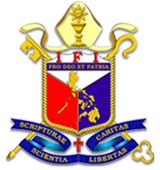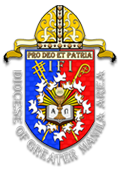O COME, EMMANUEL
Reflection for the Fourth Sunday of Advent
December 19, 2021 | Luke 1:46b – 55

By: The Rev. Victoria S. Esguerra
Retired Priest, Diocese of Greater Manila Area
(Reprinted, with permission, from “ O Emmanuel: Advent and Christmas Prayers and Reflections, ” booklet published by the Iglesia Filipina Independiente and issued at the National Clergy Convocation in Davao City, November 19, 2018.)
MICAH 5: 2-5a – PRAYER FOR THE COMING OF THE DELIVERER
Micah, an 8th century BC prophet and contemporary of Isaiah, preached to Samaria and Jerusalem and denounced the priests, prophets, and politicians (rulers). He condemned their disreputable religion, dishonest business practices, exploitation of the poor and helpless, and destitution of families. After announcing God’s judgment on the two cities, Samaria and Jerusalem, he declared that a new ruler from Bethlehem, greater than King David, would arrive to restore God’s people. From the clan of Judah, He would rule Israel, feed the flock, and they would live securely and peacefully. Micah prayed, “… what does the Lord want of you, but to do justice, and to love kindness, and to walk humbly with your God. ” (Micah 6: 8)
PSALM 80: 1-7 – PRAYER FOR ISRAEL’S RESTORATION
This is the psalmist’s (Shepherd David’s) prayer asking for mercy to be forgiven; to stop being the “laughing stock ” of the people; to be restored and to be saved. This desperate cry for help came after the exile of the Northern Kingdom of Israel but before the fall of Jerusalem. God planted a beautiful vineyard (Israel) but allowed the “boar” to ravage its fruits, according to the psalmist. The psalmist pleaded for God to save and restore it, and to make “ His face to shine upon it ” – meaning, to restore the relationship between God and His flock.
HEBREWS 10: 5-10 – PRAYER OF ENCOURAGEMENT
With the author unknown, this letter was being attributed to Paul. However, biblical scholars claimed that this was more of a prayer, unlike that of Paul’s epistle style. The writer was probably a Greek-speaking (Hellenistic) Jew but a Christian. It must have been written to an intellectual group of Jewish Christians before the fall of Jerusalem and the Temple (before 70 AD). The author reminded them of God’s displeasure of their sacrifices (burnt and sin offerings) and that by God’s will they had been sanctified by the one-time Sacrifice of our Lord Jesus Christ. This early Jewish-Christian group wavered between Judaism and Christianity. But this prayer encouraged them to strengthen their faith as “Jesus is the Perfect Prayer” offering the perfect sacrifice and providing the perfect access to God that no other sacrifices could do.
LUKE 1: 39-45 -- ELIZABETH’S PRAYER OF PRAISE
Mary visited her cousin Elizabeth, formerly barren and wife of Zechariah, who was now six months pregnant with child (John the Baptist). She walked on a four-or five-day journey from Nazareth to a town in Judea. Upon entering their house, Mary greeted Elizabeth; and the latter felt the leap of the child inside her womb. Elizabeth, filled with the Holy Spirit, then cried and prayed, “Blessed are you among women, and blessed is the fruit of your womb… and blessed is she who believed that there would be a fulfillment of what was spoken to her by the Lord. ” She felt so honored that the mother of her Lord would come to visit her; so was the same joy felt by the baby in her womb who leaped. Both Elizabeth (in her menopausal age) and Mary (in her prime age of 14 years) were blessed by God to have children, as to be childless during their time was considered a curse by God according to their social norms.
LUKE 1:46b-55 – MARY’S PRAYER (SONG) OF PRAISE – “MAGNIFICAT ”
Mary’s reply to Elizabeth’s praise was/is known as the “Magnificat ,” (Latin for “ magnify ”). According to biblical scholars, the poem (psalm) or song or prayer of the Magnificat was modelled after the prayer/song of Hannah (1 Samuel 2: 1-10), giving praise and exaltation to the Lord for giving her a child (Samuel) whom she offered in service to God. Hannah, too, was formerly barren and ostracized by society. God gave Hannah the son whom she longed for; while Israel received Samuel as the last and greatest of the judges and the first great prophet after Moses. Both Elizabeth and Hannah were delivered from their “emptiness, misery, and pain ” from social condemnation, and both were rewarded with the gifts of “life, joy, and honor, ” as the fruits of their wombs were blessed to play important roles in the salvific mission of God. Mary, though young and not barren, was also given the gift of life, Jesus Incarnate. Without her asking and no hesitation, the young bride took on the responsibility willingly without questioning God’s motives. God made sure no social “shame ” should befall upon this virtuous woman by providing her with a good spouse. Mary’s prayer of praise, thanksgiving, and jubilation in the Magnificat revealed her deep honor and joyful acceptance. “My soul magnifies the Lord, and my spirit rejoices in God my savior .” She thanked God for choosing her to be a participant in God’s divine plan; becoming a prophet by seeing the downfall of the rich, proud, and powerful; being an instrument “to fill the hungry with good things; ” and mercifully restoring the descendants (Israel) of Abraham to their rightful place in God’s kingdom.
WOMEN’S STRENGTH . In the lives of these three women, especially in Mary’s eventual role as the Mother of God, three important points are apparent and need to be pondered upon:
- Strong Faith – not ignored by God but it may be tested and perseverance will receive its reward in due time. Many biblical characters were tested in their faith: Abraham’s sojourn to foreign lands; Noah’s building an Ark (Boat) in the middle of land with no water; Moses’ crossing the Red Sea in the Exodus journey; infertile (barren) women receiving children in their old age; Mary becoming the Mother of Jesus.
- No Fear – there’s hope in reliance on the Lord. God’s motives may not be easily revealed in our own time; only God’s goodness and love should serve as our shield of protection. Prophets were called despite their reluctance: Isaiah, Jeremiah, Paul, etc.
- Be Prepared – despite the inadequacies of those who are called to fulfill God’s mission, the Lord will equip those whom are “ sent ” with the necessary provisions. Most importantly, they must be prepared for the Second Coming of the Lord with His Final Judgment.


